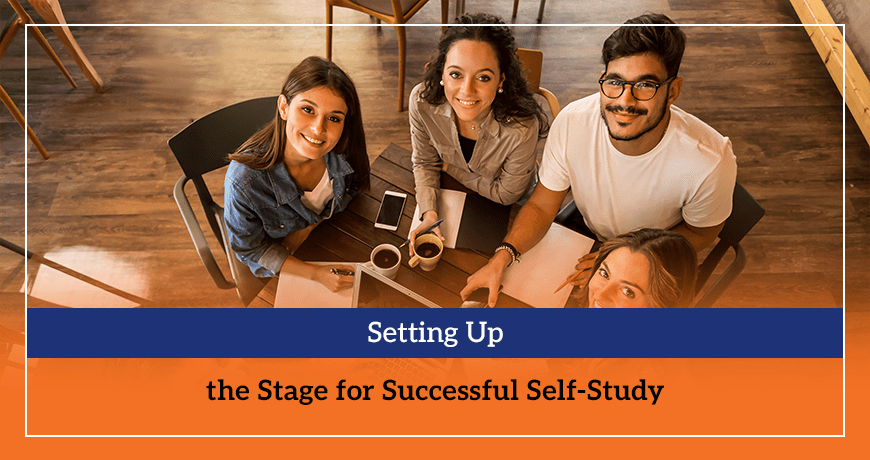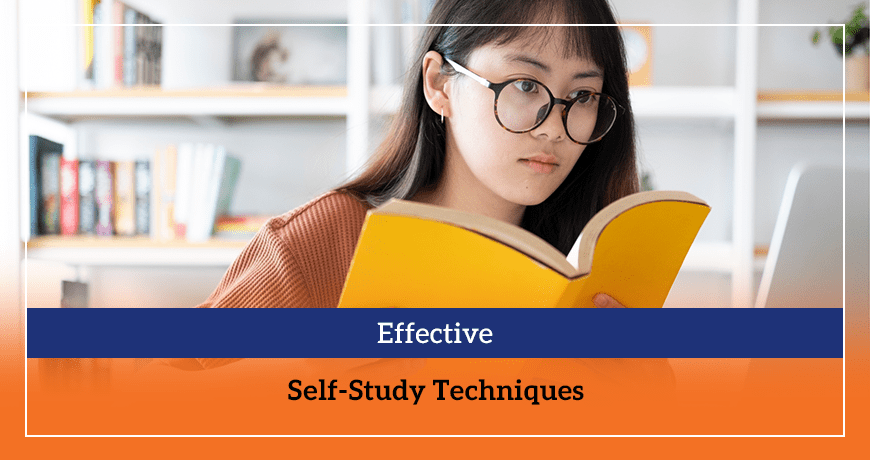Self-study is like being your own teacher. It lets you take control of your learning without relying on a classroom or a set curriculum. This approach is more popular today than ever, especially with so many online resources.
But how to do self study effectively? In this blog, we will explore how to study independently, stay focused, and make the most out of self-learning.
What is Self Study?
Self-study means learning without a teacher guiding you every step of the way. It puts you in charge, letting you decide what and how to study. This type of learning is all about exploring topics on your own, using books, videos, or any other resources.
Self-study is key to personal growth. It helps you learn new things outside the classroom, which can make a big difference in your academic or professional life.
By studying independently, you improve skills like critical thinking, which means you'll be better at solving problems and making decisions independently. It also helps you become a lifelong learner, as you won't always need someone to teach you new things.
Advantages of Self-Study
One of the best things about self-study is learning whenever and wherever we want. You set your own pace and decide how much time you want to study. Some benefits of self-studying are:
Personalized Learning
Self-study lets you focus on areas that interest you the most. If something is hard, you can take your time with it. If something is easy, you can move on quickly. It's all up to you.
Development of Self-Discipline
Studying independently teaches you to manage your time and motivate yourself. This helps you develop discipline, which is important for achieving your goals.
Encourages Active Learning
Self-study means you have to engage with the material. Instead of passively listening to a teacher, you actively find answers, solve problems, and learn new things independently.
Preparation for Lifelong Learning
Self-study builds a habit of continuous learning, which is important for personal and professional growth. It keeps your brain sharp and ready to absorb new information throughout life.

Setting Up the Stage for Successful Self-Study
Before diving into self-study, you need a solid foundation. It's not just about picking up a book or sitting at your desk. Setting the right stage for studying alone can make a big difference.
This section will explore how to get motivated and create the best learning environment. Let's take it step by step to ensure you're well-prepared.
Finding Your Motivation
Before starting self-study, knowing why you want to learn is important. Are you doing it for a career? Or maybe just for fun? These reasons are called your "motivation."
Some people are motivated by personal interest, while others might need to learn for a job or an exam. Take some time to think about what drives you. Knowing this will help keep you going, especially when things get tough.
Set Your Goals
Once you know why you're studying, it's time to set some goals. Clear goals will guide your learning. A good way to do this is by using the SMART goals method. This stands for:
- Specific: Clear your goal (e.g., "I want to finish one chapter daily").
- Measurable: Track your progress (e.g., "I will read up to ten pages").
- Achievable: Set a goal you can reach (don't aim too high or too low).
- Relevant: Your goal should matter to you (make it fit your needs).
- Time-bound: Set a deadline (e.g., "I'll complete this by Friday").
Creating a Study Plan
A good plan makes everything easier. Start by making a weekly and daily schedule. Decide how many hours a day you want to study. Spread your subjects or topics over the week to avoid feeling overwhelmed.
Effective planning tools are available, such as Google Calendar and Trello. These apps can remind you when to study and help you stay organised.
Choosing the Right Environment
Where you study matters a lot. Usually, most of us like to find a quiet place with no distractions. A clean, comfortable desk with good lighting is perfect. Ensure your chair is comfortable as well, so you don't get tired.
Selecting Resources for Self-Study
After setting up your study plan and space, the next step is choosing the right resources. In self-study, you'll be your teacher, so the tools you use are crucial. Fortunately, numerous resources are available today, both online and offline.
Online vs. Offline Resources
There are two main types of study resources: online and offline. Let's look at the differences.
- Online Resources: These include websites, videos, and apps that can be accessed on your phone or computer. They're easy to find and use; many are available for free or at a low cost.
- Offline Resources: These include books, printed materials, and physical tools. They may cost more, but they are reliable, and you don't need an internet connection.
Pick what works best for you! Online options are great for interactive learning, while books can help with focused, uninterrupted study.
Books, Online Courses, and Open Educational Resources
Books are one of the most reliable study resources. You can find textbooks in libraries or even online. Some websites, like Project Gutenberg, offer free books. For courses, websites like Coursera and Khan Academy offer numerous options, often at no cost.
Open Educational Resources (OER) are also great. They are free materials you can find online, covering almost any subject.
Videos, Podcasts, and Webinars
Tutorial videos can help make difficult topics easier to understand. Websites like YouTube offer numerous educational channels that explain topics in a step-by-step manner. Podcasts are also a fun way to learn while on the go. You can listen to them while exercising or commuting.
Webinars are live sessions where experts teach a topic. They often allow you to ask questions, which can help you learn better.
Study Groups and Online Communities
Studying alone can sometimes feel lonely. Joining a study group can make learning more fun and keep you motivated. You can find online study groups on Reddit, Discord, or social media platforms. These groups let you ask questions, share resources, and learn from others.

Effective Self-Study Techniques (Self-Study Methods)
Now that you've got your resources, it's time to talk about how to study effectively!
Self-study is different from classroom learning. You're in control, but you need the proper techniques to stay focused. So, let's explore some helpful strategies for getting the most out of your study time.
Active Learning
Active learning involves engaging directly with the material you're studying. Instead of just reading or listening, you should interact with the material.
For example, summarise what you've just learned in your own words. You can also teach someone else, even if it's just a pretend lesson. Another effective method is to use practice questions to test your understanding.
Note-Taking Methods
Taking good notes is key to remembering what you learn. One popular method is Cornell Notes. This helps you organise your notes by dividing the page into sections.
Another fun way is Mind Mapping. This technique enables you to create a diagram that illustrates the connections between ideas.
Apps like Evernote and Notion can help you organise your notes for digital note-taking.
Time Management
Managing your time effectively is crucial when self-studying. One method is the Pomodoro Technique. In this method, you study for 25 minutes and then take a 5-minute break. Repeat it and take a more extended break after four sessions.
Another method you may apply is time blocking. You divide your day into chunks and assign each chunk to a task. Always balance study time with breaks. It keeps your brain fresh.
Self-Assessment and Practice
Finally, and most importantly, you should regularly check your performance. You can do this by testing yourself with quizzes or flashcards. Tools like Quizlet and Anki are great for this. Practice makes perfect, so keep testing yourself to see how much you've learned.
Overcoming Challenges in Self-Study
Self-study can be tough at times. Staying motivated and avoiding distractions are common problems. But don't worry—there are ways to overcome these challenges. In this section, we'll go through simple tips to help you stay on track and keep moving forward.
Staying Motivated
Motivation can fade over time, especially if the topic is tricky or you feel stuck. To stay motivated, reward yourself for meeting small goals. This could be a treat or a fun break. Self-care is essential, too. Take time to relax so you don't burn out.
Managing Distractions
Distractions can come from anywhere—your phone, social media, or even your environment. It's important to know what distracts you the most. Once you know, you can take steps to avoid it.
For example, turn off notifications on your phone or use apps like Focus@Will or Cold Turkey to block distracting websites. If you're distracted by noise, try listening to calming music or using earplugs.
Dealing with Procrastination
Procrastination happens to everyone. It's easy to get distracted or feel lazy. One tip to beat procrastination is the Two-Minute Rule. If something takes less than two minutes, just do it now.
Another helpful trick is habit stacking, which means adding a new habit to something you already do. For example, if you drink coffee every morning, use that time to read a quick article or review notes.

Evaluating Your Progress
When you're studying on your own, it's good to see how you're doing. Just like a teacher checks your work in class, you should check your progress. This helps you determine if you're on the right path or if you need to adjust your study approach.
Set Your Milestones
One way to check your progress is by setting small goals or milestones. These are like stepping stones toward your bigger goal.
For example, if you want to learn a new subject, you can break it down. First, aim to finish one chapter, then another, until you finish the entire book. Small goals make studying easier and keep you motivated because you feel good about each step you complete.
Reflecting on Learning
After a study session, take some time to think about what you've learned. Did you understand everything? Was any topic too hard for you? Question yourself.
Reflection helps you determine what's working and what needs more work. After each session, you can record your thoughts in a small journal.
Seeking Feedback
Even though you're studying alone, feedback is still necessary. You can ask friends, family, or people in online study groups to review your work. Sometimes, getting another person's opinion helps you catch mistakes or see things differently.
Adapting and Evolving Your Self-Study Routine
As you continue studying, some methods are no longer as effective as they once were. Or, you might discover new ways to study that are even better! It's okay to change your routine. Adapting and improving your study habits is a great way to keep learning.
Take time to examine your study habits. If your method isn't working, try something new. Changing your schedule or using a different study tool can help you study more effectively.
Additionally, you don't have to stick with the same old routine. As you find new resources or methods, try them out!
The more flexible you are with your study methods, the easier it becomes to keep learning new things. Staying open to new ideas and resources will help you grow now and throughout your life.
Tools and Resources for Self-Study
Having the right tools can make your self-study journey much easier. Many resources exist to help organise your schedule, take notes, or test what you've learned.
Planning Tools
Keeping track of your study schedule is important. Apps like Google Calendar or Trello can help you plan your study time. You can set reminders for when to study with Google Calendar. With Trello, you can create boards to organise your task list.
Note-Taking Tools
Apps like Evernote and Notion are super helpful when taking notes. These tools let you organise your notes. You can easily create folders for different subjects, add links or pictures, and even search your notes.
The best part? You can access your notes anywhere, whether on your phone or computer.
Learning Platforms
Many online platforms like Khan Academy and Coursera exist if you need lessons or courses. These sites offer lessons on various subjects, and some are even free of charge. You can watch videos, take quizzes, and learn at your own pace. They're great if you want some structure to your learning.
Assessment Tools
Apps like Quizlet and Anki help you make flashcards and quizzes to review your knowledge. You can use these apps to create study sets or find ones other students have already made. Testing yourself daily will help you remember things more effectively.
Conclusion
Self-study is a powerful way to take control of your learning. It's flexible, cost-effective, and encourages lifelong learning. Start today by setting clear goals, choosing the right resources, and staying motivated. Self-study can open up endless possibilities, so why not give it a try? Let us know about your self-study experiences in the comments!
Also Read: